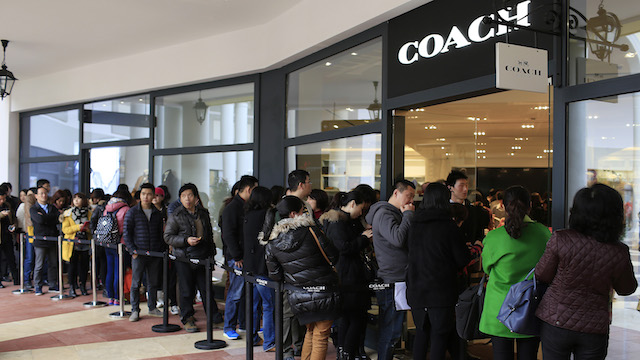Shares of Tapestry, the parent company of Coach and Kate Spade, fell 14 per cent last Thursday after management warned that newly imposed US tariffs will erode profits even as consumer appetite for its bags and accessories shows no signs of slowing. For the quarter ended June 28, revenue climbed 8 per cent to US$1.7 billion, while net loss was $517 million. The headline figures were overshadowed by warnings of external pressures that could weigh heavily on the company’s near-term outlook. A
ok.
A record year, overshadowed
For the fiscal year, Tapestry reported revenue of $7 billion, up 5 per cent. Net income, however, plunged from $816 million to $183 million.
North America remains the largest market, accounting for 61 per cent of Coach sales, with a 5 per cent increase in sales for the year. In Greater China, revenue grew 5 per cent for the year. Europe, too, posted a 28 per cent annual increase. Meanwhile, sales in Japan dropped 7 per cent year on year.
Coach alone generated $5.6 billion in annual sales, or roughly 80 per cent of Tapestry’s revenue, with quarterly growth of 13 per cent. China surged 22 per cent and the US advanced 16 per cent. Average unit retail prices rose in the mid-teens percentage range, a sign of strong pricing power at a time when many luxury players are struggling to defend margins.
“Coach, like Ralph Lauren, is benefiting from the surging demand for stylish handbags that are more affordable than traditional – an over-priced, over-produced and diminishing quality of greedy luxury brands,” Danny Younis, a luxury analyst, commented on LinkedIn.
The brand’s cultural relevance is being reinforced by celebrity visibility and a social media surge. Coach’s popularity spiked more than 800 per cent between January and August, helped by appearances ranging from Anne Hathaway carrying a Coach bag while filming “The Devil Wears Prada” sequel to endorsements from Tracee Ellis Ross.
“In fact, last week, we added another 4000 customers when Sarah Jessica Parker was featured carrying the Kisslock bag in ‘And Just Like That…’,” said Todd Kahn, CEO and brand president of Coach. “That’s an example of the brand of heat we’re talking about. That’s an example of the momentum that Coach has.”
More importantly, Coach is winning the next generation. In fiscal 2025, 60 per cent of Tapestry’s 6.8 million new North American customers came from Gen Z and millennial cohorts, according to the company. Digital sales rose at a double-digit pace, complementing steady growth in stores.
“We are creating emotional connections and reaching new young consumers as they enter our category, key to driving lifetime value and healthy durable growth,” Joanne Crevoiserat, CEO of Tapestry, said in the earnings call.
The weak links in the portfolio
Coach has become the clear growth engine, while Kate Spade’s turnaround remains uncertain. Kate Spade continues to struggle with revenue dropping 13 per cent year on year during the quarter. The performance prompted Tapestry to take $855 million in impairment charges linked to lower cash flow expectations and tariff-related costs.
“This was based upon the current business trends, the outsized impact of tariffs, which disproportionately affects Kate Spade as the vast majority of its business is in the US, and the incremental investments we’re making in support of profitable long-term growth,” Crevoiserat said.
She added that the company is taking strategic and financial steps to reset Kate Spade for long-term growth, applying the brand-building learnings from Coach and aggressively leaning into action to turn around the brand.
Meanwhile, Stuart Weitzman, the footwear brand acquired a decade ago with high hopes, has now been sold to Caleres for $105 million.
Analysts say the company’s portfolio strategy is converging on a single bet, doubling down on one horse, albeit a strong one.
The tariff shadow
The immediate concern for investors is trade policy. The end of duty-free benefits for small-value imports, coupled with new tariffs on Asian-made goods, is projected to cut into profits by as much as $160 million in fiscal 2026. Tapestry has already factored in a 230-basis-point margin hit.
“I don’t know how many people are paying attention to de minimis, but that was an opportunity that we had taken advantage of. It was the law of the time, and now the law has changed. So we have to address that,” Scott Roe, CFO and COO of Tapestry, said in the earnings call.
“We’re leveraging our agile supply chain to optimise our global manufacturing footprint, minimising our tariff exposure where possible,” Roe added.
The company makes its Coach and Kate Spade handbags primarily in countries such as Vietnam, Cambodia, the Philippines and India.
Adding to the complexity is the failed $8.5 billion bid to acquire Capri Holdings, parent of Michael Kors, Jimmy Choo and Versace. The deal collapsed under regulatory and financial pressures, forcing Tapestry to absorb millions in related costs and highlighting the limits of consolidation in an industry where scale increasingly matters.
Further reading: How Coach is powering Tapestry’s growth amid a luxury slowdown.







